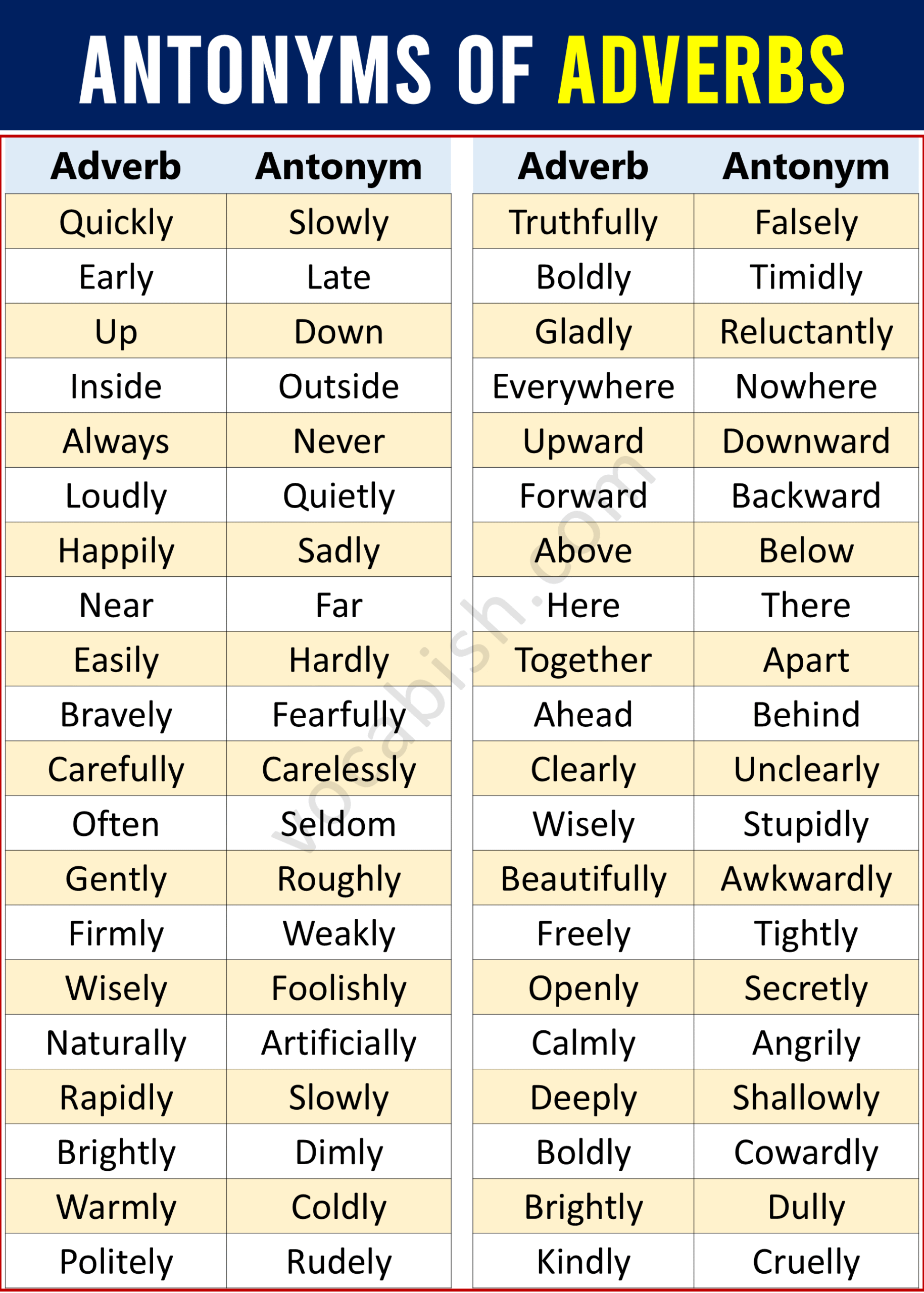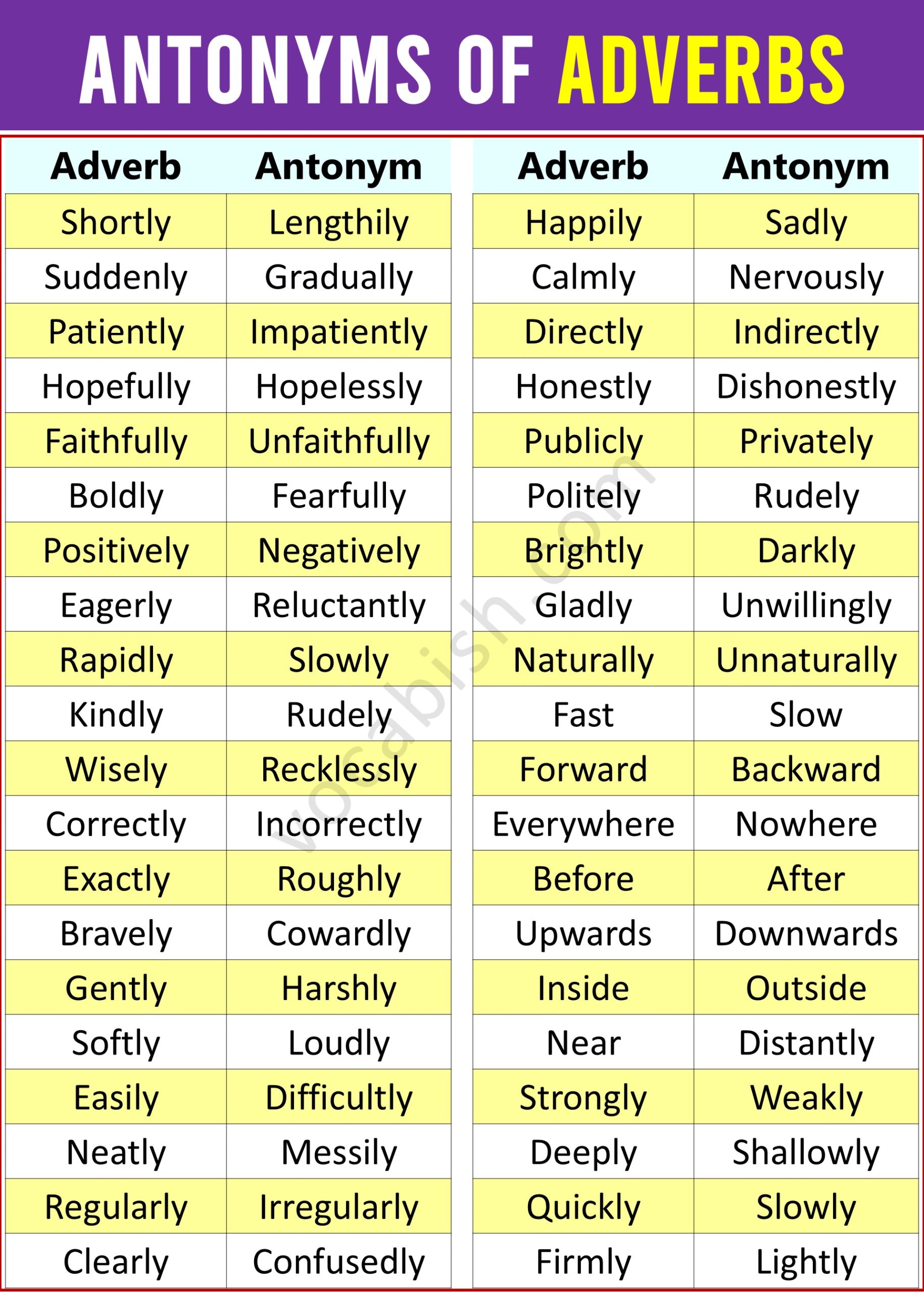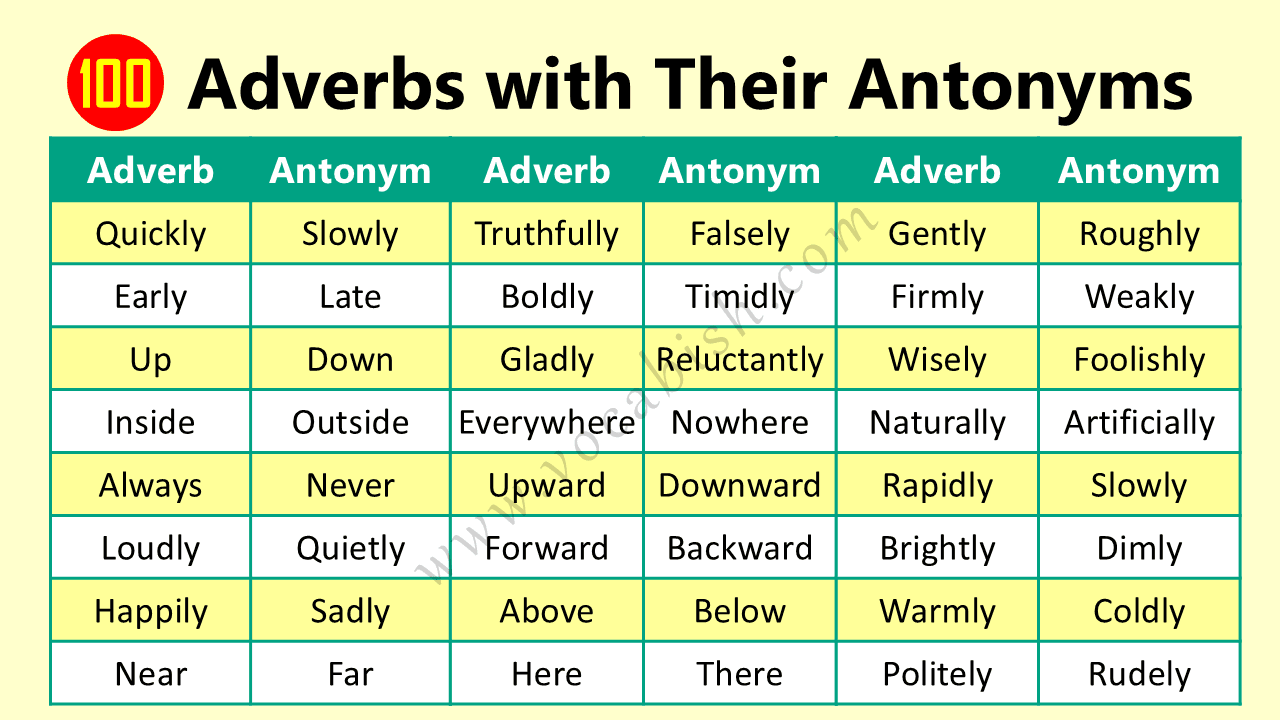Learning adverbs and their opposites is very helpful for English learners who want to make their writing and speaking more precise. Knowing the right adverb and its antonym improves your reading and listening skills, too, because you can understand sentences more clearly. In this blog post, you will learn 100 common adverbs along with their opposite words, complete with examples that show how to use them correctly in everyday English.
What are Adverbs?
An adverb is a word that describes a verb, adjective, or another adverb. It tells how, when, where, or how often something happens.
Example:
- He runs quickly. (shows how he runs)
- She arrived early. (shows when she arrived)
- The cat sleeps inside. (shows where the cat sleeps)
What are Antonyms of Adverbs?
An antonym is a word that has the opposite meaning of another word. So, adverb antonyms are words that have opposite meanings in how, when, or where an action happens.
Examples:
- Quickly → Slowly
- Always → Never
- Up → Down
These opposite adverbs make your English more expressive and help you say the reverse meaning easily.
Uses of Adverbs and Their Antonyms
Adverbs and their antonyms are used to show contrast in sentences.
Examples:
- She spoke softly, but he shouted loudly.
- They arrived early, but we came late.
- He walked forward, then stepped backward.
100 Adverbs with Their Antonyms

| No. | Adverb | Antonym (Opposite Adverb) |
|---|---|---|
| 1 | Quickly | Slowly |
| 2 | Early | Late |
| 3 | Up | Down |
| 4 | Inside | Outside |
| 5 | Always | Never |
| 6 | Loudly | Quietly |
| 7 | Happily | Sadly |
| 8 | Near | Far |
| 9 | Easily | Hardly |
| 10 | Bravely | Fearfully |
| 11 | Carefully | Carelessly |
| 12 | Often | Seldom |
| 13 | Gently | Roughly |
| 14 | Firmly | Weakly |
| 15 | Wisely | Foolishly |
| 16 | Naturally | Artificially |
| 17 | Rapidly | Slowly |
| 18 | Brightly | Dimly |
| 19 | Warmly | Coldly |
| 20 | Politely | Rudely |
| 21 | Honestly | Dishonestly |
| 22 | Truthfully | Falsely |
| 23 | Boldly | Timidly |
| 24 | Gladly | Reluctantly |
| 25 | Everywhere | Nowhere |
| 26 | Upward | Downward |
| 27 | Forward | Backward |
| 28 | Above | Below |
| 29 | Here | There |
| 30 | Together | Apart |
| 31 | Ahead | Behind |
| 32 | Clearly | Unclearly |
| 33 | Wisely | Stupidly |
| 34 | Beautifully | Awkwardly |
| 35 | Freely | Tightly |
| 36 | Openly | Secretly |
| 37 | Calmly | Angrily |
| 38 | Deeply | Shallowly |
| 39 | Boldly | Cowardly |
| 40 | Brightly | Dully |
| 41 | Kindly | Cruelly |
| 42 | Lovingly | Harshly |
| 43 | Cheerfully | Gloomily |
| 44 | Gracefully | Clumsily |
| 45 | Gladly | Sadly |
| 46 | Nearer | Farther |
| 47 | Firmly | Loosely |
| 48 | Quietly | Noisily |
| 49 | Usually | Rarely |
| 50 | Clearly | Vaguely |
Adverbs Opposite Words List

| No. | Adverb | Antonym (Opposite Adverb) |
|---|---|---|
| 51 | Shortly | Lengthily |
| 52 | Suddenly | Gradually |
| 53 | Patiently | Impatiently |
| 54 | Hopefully | Hopelessly |
| 55 | Faithfully | Unfaithfully |
| 56 | Boldly | Fearfully |
| 57 | Positively | Negatively |
| 58 | Eagerly | Reluctantly |
| 59 | Rapidly | Slowly |
| 60 | Kindly | Rudely |
| 61 | Wisely | Recklessly |
| 62 | Correctly | Incorrectly |
| 63 | Exactly | Roughly |
| 64 | Bravely | Cowardly |
| 65 | Gently | Harshly |
| 66 | Softly | Loudly |
| 67 | Easily | Difficultly |
| 68 | Neatly | Messily |
| 69 | Regularly | Irregularly |
| 70 | Clearly | Confusedly |
| 71 | Happily | Sadly |
| 72 | Calmly | Nervously |
| 73 | Directly | Indirectly |
| 74 | Honestly | Dishonestly |
| 75 | Publicly | Privately |
| 76 | Politely | Rudely |
| 77 | Brightly | Darkly |
| 78 | Gladly | Unwillingly |
| 79 | Naturally | Unnaturally |
| 80 | Fast | Slow |
| 81 | Forward | Backward |
| 82 | Everywhere | Nowhere |
| 83 | Before | After |
| 84 | Upwards | Downwards |
| 85 | Inside | Outside |
| 86 | Near | Distantly |
| 87 | Strongly | Weakly |
| 88 | Deeply | Shallowly |
| 89 | Quickly | Slowly |
| 90 | Firmly | Lightly |
| 91 | Bravely | Fearfully |
| 92 | Loudly | Softly |
| 93 | Carefully | Recklessly |
| 94 | Freely | Strictly |
| 95 | Easily | Hardly |
| 96 | Gently | Roughly |
| 97 | Brightly | Faintly |
| 98 | Joyfully | Sadly |
| 99 | Boldly | Timidly |
| 100 | Happily | Miserably |
Summary on Adverbs Opposite Words
✔ Adverbs describe how, when, or where something happens.
✔ Antonyms give the opposite meaning of a word.
✔ Learning both helps improve spoken and written English.
✔ Use adverb pairs in your daily communication for better fluency.
FAQs on Adverbs and Their Antonyms
What are adverbs and their antonyms?
Adverbs describe actions, while antonyms are their opposite words. For example, quickly ↔ slowly.
Why should I learn adverb antonyms?
Because they help you express contrasting ideas clearly and make your speech more natural.
Can an adverb modify another adverb?
Yes. Example: She spoke very softly.
Are all adverbs ending with “-ly”?
No. Some adverbs like fast, hard, late, or well do not end with “-ly”.
How can I use adverbs and antonyms in writing?
Use them to add clarity, emotion, and contrast to your sentences.
Read More

